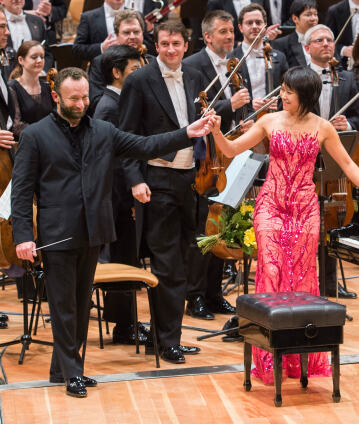Kirill Petrenko and Yuja Wang

Kirill Petrenko, chief conductor designate of the Berliner Philharmoniker, presents two sonorous rarities: Paul Dukas’s iridescent tone poem La Péri and Franz Schmidt’s Fourth Symphony. The latter is a gently flowing work in the tradition of Anton Bruckner with a powerful funeral march as the highlight. Prokofiev’s Piano Concerto No. 3, on the other hand, played here by Yuja Wang, is a cheerful and virtuoso work.
Seduction, death and the longing for immortality are the themes of the Poème dansé La Péri by Paul Dukas. The French composer, known as the creator of the tone poem The Sorcerer’s Apprentice, was commissioned to write the work – based on an ancient Persian saga – by Sergei Diaghilev, the founder of the Ballets Russes. After Diaghilev cancelled the planned premiere, the piece was first performed at the Théâtre du Châtelet in Paris in 1912 and scored a triumphant success for the impresario and the composer. The music captivates with its exotic atmosphere and sophisticated use of orchestral tonal colours.
The programme also includes the Fourth Symphony by Austrian composer Franz Schmidt, who was a cellist in the Vienna Court Opera orchestra during the Mahler era. He later recalled: “[Mahler’s] directorship hit the opera house like a force of nature: An earthquake of enormous strength and duration shook the building to its very foundations. Everything that was old, outdated or in bad condition was destroyed and was gone forever. Vienna then experienced one of the most dazzling musical periods that the city had ever experienced.” Schmidt wrote his symmetrically structured Fourth many years later – after the death of his only daughter: music full of a sense of farewell and grief-stricken love. It begins with a theme of resignation from a solo trumpet which Schmidt called the “last music taken into the hereafter, after one has been born under its auspices and has lived one’s life”. After a broad, passionato theme with which, in the words of the composer, “one’s whole life passes through the mind,” there follows a moving Adagio as a funeral march for his dead daughter. The Scherzo ends avowedly in “catastrophe”, while in the final recapitulation of the first movement, as Schmidt said, everything appears “more mature and transfigured” by all that has intervened.
Between the two works mentioned, Kirill Petrenko has programmed Sergei Prokofiev’s neoclassical Third Piano Concerto which (similar to Igor Stravinsky’s Pulcinella music) sounds like a modernised stylistic copy of an old master. The soloist is Yuja Wang, whose fingers at times steal over the piano keys at breathtaking speed. No wonder some people think she “must have more than two hands” (Die Zeit).
© 2018 Berlin Phil Media GmbH
Related interviews
Artists
Our recommendations
- Yuja Wang’s debut with the Berliner Philharmoniker
- Kirill Petrenko conducts Beethoven and Elgar
- Season opening 2018: Kirill Petrenko conducts Beethoven and Strauss
- Kirill Petrenko with Mahler’s Ninth
- Kirill Petrenko conducts Mozart, Berg and Brahms at Suntory Hall in Tokyo
- Kirill Petrenko conducts Tchaikovsky and Rachmaninov